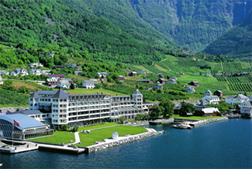by Thibauld Chatel
It is not that often I’ve met someone that is so impressive I’m compelled to tell the world about it. This is the story of just such a person.
 Last Fall, SNG partnered with the Norwegian University of Science and Technology (NTNU) of Trondheim, providing support to an e-Solutions Benchmarking project on the hospitality sector of the Hardanger Fjord area in Norway, an area extremely dependent on tourism.
Last Fall, SNG partnered with the Norwegian University of Science and Technology (NTNU) of Trondheim, providing support to an e-Solutions Benchmarking project on the hospitality sector of the Hardanger Fjord area in Norway, an area extremely dependent on tourism.
Amongst the respondents was the Hotel Ullensvang, a 300 bed hotel located just between mountain and sea. The hotel’s use of broadband earned them a lofty score of 9 on a 10 point scale on SNG’s Digital Economy index (DEi) for broadband utilization.
In speaking with Geir Midtun, the IT manager of the hotel (yes they have one!), it became clear to me that they understand the very essence of what broadband can be: a powerful means for economic development.
“We are located quite remote from most of our clients and most of our suppliers. We have a two hours drive by car to the nearest railway station and a three hours drive to the nearest airport. Using the internet is our way of getting closer to our clients and suppliers, on a daily basis, and broadband makes it fast enough to be useful. Broadband is our connection to the rest of the world. We consider broadband one of the primary reasons we are able to do business the way that we do. A large hotel in a small rural village, remote and “exotic,” but still connected to the world.”
And so for example, broadband enables the hotel to host international seminars on a regular basis, in a place where you can now relax and do business without limits.
But how do they get there? Since broadband was introduced in the area in 2004, it has been an ongoing process of improvement, strongly supported by the hotel owners and managers. Every step they took was based on the remote location of the hotel and that they needed to be connected in order to thrive. As Geir explains, they can make a long, very long list of benefits and cost saving from using broadband and e-solutions.
“Computer systems, booking systems, TV-systems, ventilation and air condition systems etc. can be checked and maintained/serviced by ‘remote control.’ A few years ago, service personnel from Bergen had to make a six hours drive (back and forth) to do a job that perhaps took 15 minutes. Our credit card terminals now use broadband instead of the telephone lines. This enables full integration with the booking- and accounting software. Our sales staff can connect to our server when they are out travelling, to check availability and make bookings online from wherever they are, worldwide. Our accounting services are now taken care of by a company in Stavanger, 170 kilometers away. Thanks to broadband we can stay online with them all day long, without having to think about extra costs.”
Add to the list of benefits broadband brings are:
- Quality of service for hotel patrons
- Online marketing capabilities via Facebook, YouTube, and 360° webcams
- Teleworking availability for patrons
- Online training for staff
- The ability to tele-interview prospective staff additions
- Increased quality of life for staff as they are able to communicate with their families and watch homeland television
The Ullensvang hotel has 50 employees and is thriving in a remote area of Norway because of what they are doing with their broadband. Asked what the Ullensvang Hotel would be like without broadband, the hotel’s managing director, Hans Edmund, Utne explains that the Internet today are just as important to his business as roads were to his predecessor 100 years ago. But this requires champions like Geir Midtun who understood how technology enabled by broadband could enhance and transform the hotel’s business.
